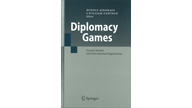
Diplomacy Games. Formal Models and International Negotiations
Avenhaus R, Zartman IW (eds.) (2007). Springer-Verlag, Heidelberg, Germany.

Abstract
In this book, leading experts in international negotiations present formal models of conflict resolution and international negotiations. Besides the description of different models and approaches, the book answers three questions:
How can the abstract concepts and results of rational choice theorists be made more understandable and plausible to political and social scientists not trained to work with formal models? What can be done to encourage practitioners to use not only simple but also mathematically advanced approaches in their analysis of real world negotiation problems? How can practioners (e.g., politicians and diplomats) become interested in, take into account, and apply formal models of their more important problems?
Introduction: Formal Models of, in, and for International Negotiations Rudolf Avenhaus, I. William Zartman Part I General Evaluations
Game Models of Peace and War: Some Recent Themes Barry O'Neill
Formal Models of Intervention: A Stocktaking and Analysis of the Implications for Policy David Carment, Dane Rowlands
Rationality of Choice versus Rationality of Knowledge Andrzej P. Wierzbicki
Negotiation Models and Applications Daniel Druckman
Part II Models of International Negotiations
A Dynamical Systems Model of Small Group Decision Making Michael Gabbay
Formal Methods for Forecasting Outcomes of Negotiations on Interstate Conflicts Rudolf Avenhaus, Thomas Krieger
Bridging Games and Diplomacy Michel Rudniansk, Hélène Bestougeff
Greek?Turkish Territorial Waters Game Serdar ?. Güner
Part III Models in International Negotiations
Some Lessons from the Use of the RAINS Model in International Negotiations Markus Amann
Converting Competition to Collaboration: Creative Applications of Models in the Law of the Sea Negotiations Caitlyn L. Antrim.
Part IV Models for International Negotiations
International Negotiations on Climate Change: A Noncooperative Game Analysis of the Kyoto Protocol Akira Okada
The Graph Model for Conflict Resolution as a Tool for Negotiators D. Marc Kilgour
A Minimax Procedure for Negotiating Multilateral Treaties Steven J. Brams, D. Marc Kilgour, M. Remzi Sanver
"Adjusted Winner" (AW) Analyses of the 1978 Camp David Accords ? Valuable Tools for Negotiators? Rudolf Schüssler
Procedural Design for Conflict Resolution Matthias G. Raith
Conclusion: Lessons for Theory and Practice I. William Zartman, Rudolf Avenhaus
About the Editors
Rudolf Avenhaus is Professor of Statistics and Operations Research at the University of the Federal Armed Forces Munich, Germany. Prior to his academic appointment in 1980, he was a research assistant in the Mathematical and Physical Institutes at the Universities of Karlsruhe and Geneva; a research scholar at the Nuclear Research Center, Karlsruhe; and a lecturer at the University of Mannheim. From 1973 to 1975, and again in 1980, he worked at IIASA. Professor Avenhaus has written numerous scientific publications, as well as Material Accountability (1977), Safeguards Systems Analysis (1987), and Compliance Quantified (together with M. Canty, 1996). In 1989 and 1990 he was chairman of his faculty; in 1993 and 1994, vice president; and in 1994, acting president of his university.
I. William Zartman is Jacob Blaustein Professor of International Organizations and Conflict Resolution at the Nitze School of Advanced International Studies of Johns Hopkins University. He is the author of The Practical Negotiator, The 50% Solution, and Ripe for Resolution; the editor of The Negotiation Process and Positive Sum, among other books; and the editor of Preventive Negotiation, the most recent book in the Processes of International Negotiation (PIN) series. He is organizer of the Washington Interest in Negotiations (WIN) Group and was distinguished fellow at the United States Institute of Peace.


